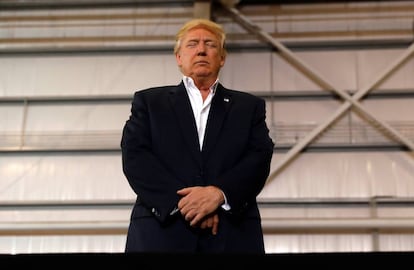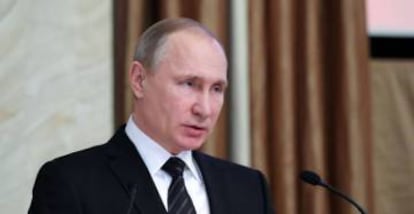Trump’s mad cows
The elimination of the desire to distinguish truth from lies follows the example of Russia, where this disease has been incubating for centuries

“The spirit of Russia is the spirit of cynicism.”
Joseph Conrad, writer, in 1911
Two cows are chatting in a field.
—Have you heard about Mad Cow Disease?
—Yes, of course.
—I’m very worried about it.
—Not me.
—Why not?
—I’m a rabbit.
This joke appeared in an English newspaper about 15 years ago, amidst widespread fear that the bovine disease would wipe out half of humanity. The headlines in the UK, where the first cases were reported, screamed out that “millions” were going to die. The British government ordered the extermination of five million head of cattle, European meat consumption plummeted and cattle farmers found themselves living a nightmare: more of them died from suicide than from the dreaded brain disease in Britain.
After the hysteria subsided, I spoke with John Adams, a professor at University College London and a risk specialist. He told me that the panic that had been created did not stem from science, and that it had been absurdly unnecessary. “It ends up being a matter not of objective truth, but of what one believes.”
Conrad talked about the ‘almost sublime contempt for truth’ displayed by Russia
Conrad talked about the ‘almost sublime contempt for truth’ displayed by Russia
However, Britain was the first Western country where the plague – also known as the Brexit campaign – first took hold in mid-2016. From there it leaped over to the United States, pushing 63 million Americans into the madness of electing Donald Trump for president; and now, there is a real risk that the French population will be the next victim with a potential victory by Marine LePen at the presidential elections in May.
The Russians did not patent deceit as a tool of power. But for many centuries, since well before the Bolshevik revolution, they have been using it to oil the state machinery. In 1787, Empress Catherine the Great conspired in the famous lie about the Potemkin villages, fake façades placed by one of her subjects to conceal the poverty in the newly conquered Crimea. In a book written in 1911, Joseph Conrad, the Polish novelist who wrote in English, talked about the “almost sublime contempt for truth” displayed by the Russian state. We will not even discuss Stalin, and as for that current autocrat, Vladimir Putin, lying is a habit with him, and one of the many examples that come to mind was the denial of Russia’s flagrant military participation in the imperial recovery of (once again) Crimea in 2014.
America’s political world has been russified
Peter Pomerantsev, a British national who was born to Russian émigrés, published a book in 2015 about Putin’s Russia titled Nothing is True and Everything is Possible. His work, based on 10 years of working as a television producer in Moscow, details how the Kremlin fabricates reality. Fake opposition parties legitimize a fake democracy with a fake judiciary and a media machine that churns out fake news, all with the goal of perpetuating the power of a de facto police state in which the real dissidents are threatened, jailed, or in extreme cases, assassinated.
None of this has stopped Donald Trump, Marine Le Pen and Nigel Farage, the man behind the Brexit victory at the referendum in June of last year, from becoming fans of Putin, a Stalin lite. They admire his cynicism. During the US presidential campaign, Trump went so far as to encourage the Russian regime to leak negative information about his rival, Hillary Clinton, and the cyber-warriors at Putin’s service followed his advice, as every intelligence service in the US has now established.
Following the flood of allegations of collusion between the Russians and the Trump campaign to influence the outcome of the November vote, and which the FBI is now investigating, there are those who claim that the new US president is a puppet placed in the White House by Moscow. That is science fiction. What has come to pass in the real world represents an unforeseen triumph for Putin against the old enemy.

America’s political world has been russified. Half of the population now feels it is irrelevant whether the statements coming out of the executive are a lie or not. They have abandoned reason to embrace faith, and like cattle on their way to the slaughterhouse, they are happy to let themselves be fooled by the president and his buddies. Masha Gessen, a journalist who was born in Russia, wrote in The New York Review of Books: “Lying is the message. It’s not just that both Putin and Trump lie, it is that they lie in the same way and for the same purpose: blatantly, to assert power over truth itself.”
Combat line
What to do? Unlike Russia, the US fortunately does have institutional antibodies, among which are Congress, judges and the press, which is already smelling a new Watergate. France and Germany have similar defense mechanisms, and they have taken pre-electoral care to set up systems to neutralize Russia’s already visible misinformation cyber campaign.
But Trump has already won in the US; half the country has been infected by the virus of “alternative facts,” to use the curiously candid definition provided by the counselor and ex-campaign manager for Trump, Kellyanne Conway. The time has come to fight, to prevent the disease that has already corroded so many brains from migrating to the marrow of the political system.
America’s so-called traditional press is on the front line of the battle. That is why, in one of his infamous tweets, the nation’s commander, troller-in-chief and serial liar identified The New York Times, NBC, ABC, CBS, CNN and others as “the enemies of the American people.” The battle is on. What’s at stake is the democracy of George Washington and Abraham Lincoln, both of whom were real presidents. Donald Trump is not. He’s not even a rabbit. He’s a mad cow.
English version by Susana Urra.
Tu suscripción se está usando en otro dispositivo
¿Quieres añadir otro usuario a tu suscripción?
Si continúas leyendo en este dispositivo, no se podrá leer en el otro.
FlechaTu suscripción se está usando en otro dispositivo y solo puedes acceder a EL PAÍS desde un dispositivo a la vez.
Si quieres compartir tu cuenta, cambia tu suscripción a la modalidad Premium, así podrás añadir otro usuario. Cada uno accederá con su propia cuenta de email, lo que os permitirá personalizar vuestra experiencia en EL PAÍS.
¿Tienes una suscripción de empresa? Accede aquí para contratar más cuentas.
En el caso de no saber quién está usando tu cuenta, te recomendamos cambiar tu contraseña aquí.
Si decides continuar compartiendo tu cuenta, este mensaje se mostrará en tu dispositivo y en el de la otra persona que está usando tu cuenta de forma indefinida, afectando a tu experiencia de lectura. Puedes consultar aquí los términos y condiciones de la suscripción digital.








































